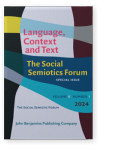peace
Constructing resistance in the quest for social justice
A study of a fracturing in Thai hegemony
This study adopts the concept of “positive peace” and draws on critical discourse studies to investigate the texts
of two Thai activists responding to the 2006 coup d’état and subsequent events in Thailand. The study analyses
the texts from a systemic functional linguistic (SFL) perspective to show how the first text challenges the legitimacy of the
coup, and how the second text reflects a widening of the cracks then appearing in Thai royalist hegemony. In particular, the study
compares the construal of one social actor in the first text published in 2007 with that in the speech of the second activist
three years later, highlighting how the meaning of a key word evolved from one of oppression to one of pride.
Article outline
- 1.Introduction
- 2.Methodology
- 3.Context and data
- 3.1Thai socio-political context, 2006–2010
- 4.Pitch
- 4.1
Phrai – subject, commoner, peasant
- 4.2The challenge
- 4.3
engagement
- 4.4
agency
- 5.Natthawut
- 5.1
Phrai-Ammart – commoner-aristocrat
- 5.2Phasing
- 5.3
engagement
- 5.4
agency
- 6.Conclusion
- Acknowledgements
- Notes
-
References
